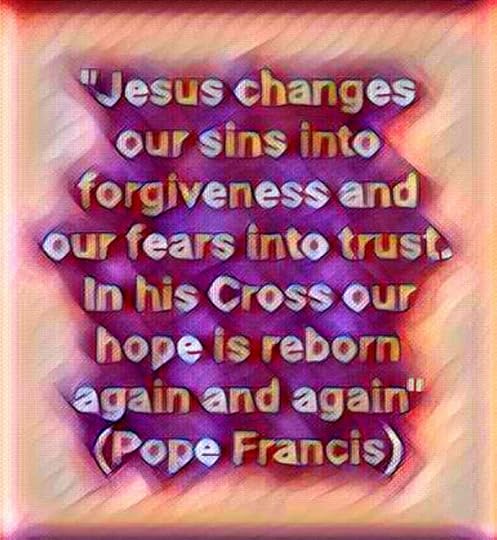John Janaro's Blog, page 189
April 5, 2018
What We Ate on Easter Sunday
With all that has been happening with taking care of my parents at this time, we didn't have the usual multicourse Easter dinner with lamb. Which is not to say we didn't have a lovely meal.
Eileen cooked up a generous amount of delicious cannelloni with beef and spinach and a béchamel sauce:

Here, have a closer look:

These were so wonderfully flavorful, and quite satisfying.
For dessert, Agnese baked a carrot cake with homemade icing. What a superb cake it was!
Eileen cooked up a generous amount of delicious cannelloni with beef and spinach and a béchamel sauce:

Here, have a closer look:

These were so wonderfully flavorful, and quite satisfying.
For dessert, Agnese baked a carrot cake with homemade icing. What a superb cake it was!
Published on April 05, 2018 19:00
April 4, 2018
Fifty Years Ago Today, a Shot Rang Out in the Memphis Sky...
Monday, April 4, 1968. 6:01 PM Central Standard Time. Memphis, Tennessee. Fifty years ago today, the Reverend Dr. Martin Luther King Jr. sealed a life lived in sacrifice for racial justice for African-Americans, for the truth that every human person deserved to be treated with dignity, for his commitment to non-violence as the weapon that seeks to defeat enemies by changing their hearts and turning them into friends.
He had already meditated much on death, and had accepted it as a price he was willing to pay, a sacrifice that he knew—in God's plan—would bear fruit.
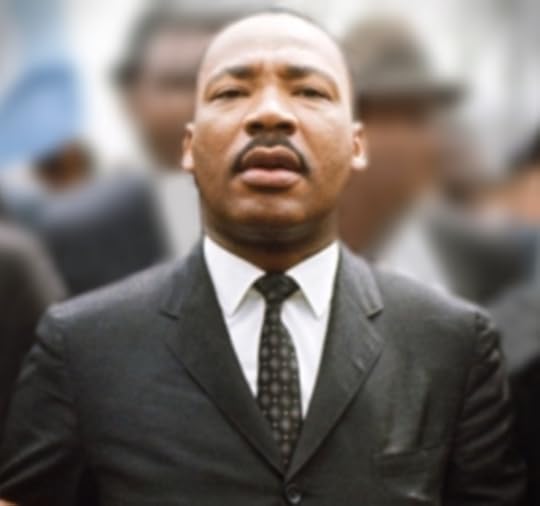
Some words of the Rev. Dr. Martin Luther King Jr. reflecting about the possibility of his own death by violence:
"If physical death is the price I must pay to free my white brother and all my brothers and sisters from a permanent death of the spirit, then nothing could be more redemptive" (1964).
"I've never known anybody to achieve freedom until somehow they were willing to say within that death is not the ultimate evil.... If we are going to be free, we have to be willing to suffer and sacrifice for that freedom, if necessary" (1965).
"If something happens to me physically, or if I come to a violent end, I will go on with the faith that unmerited suffering is redemptive. And I don't think the important thing really is how long you live, but how well you live. And I'm not concerned about my longevity or the quantity of my life, but the quality of my life...trying to do a good job for humanity and for my race and for the human race and for my children and for God" (1967).
"Like everybody I would like to live a long life. Longevity has its place. But I'm not concerned about that now. I just want to do God's will" (1968).
"Ben, make sure you play Take My Hand, Precious Lord in the meeting tonight. Play it real pretty" (April 4, 1968, reportedly his last words, to bandleader Ben Branch just moments before the bullet came).
He had already meditated much on death, and had accepted it as a price he was willing to pay, a sacrifice that he knew—in God's plan—would bear fruit.

Some words of the Rev. Dr. Martin Luther King Jr. reflecting about the possibility of his own death by violence:
"If physical death is the price I must pay to free my white brother and all my brothers and sisters from a permanent death of the spirit, then nothing could be more redemptive" (1964).
"I've never known anybody to achieve freedom until somehow they were willing to say within that death is not the ultimate evil.... If we are going to be free, we have to be willing to suffer and sacrifice for that freedom, if necessary" (1965).
"If something happens to me physically, or if I come to a violent end, I will go on with the faith that unmerited suffering is redemptive. And I don't think the important thing really is how long you live, but how well you live. And I'm not concerned about my longevity or the quantity of my life, but the quality of my life...trying to do a good job for humanity and for my race and for the human race and for my children and for God" (1967).
"Like everybody I would like to live a long life. Longevity has its place. But I'm not concerned about that now. I just want to do God's will" (1968).
"Ben, make sure you play Take My Hand, Precious Lord in the meeting tonight. Play it real pretty" (April 4, 1968, reportedly his last words, to bandleader Ben Branch just moments before the bullet came).
Published on April 04, 2018 18:30
April 3, 2018
Easter: God Has Come to the Place Where I Am
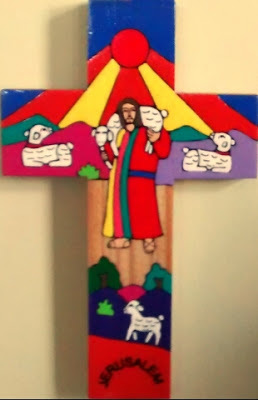 When we tell people, "God loves you," they might be inclined to reply (not without reason) "What does that mean?"
When we tell people, "God loves you," they might be inclined to reply (not without reason) "What does that mean?"And if we think it's easy to answer this question, we might not be taking God or people as seriously as we should.
I feel the force and mysterious depth of this question especially when life gets hard. My desire is for the fullness of life, but my experience in the midst of persistent obstacles seems to suggest that there is no way to get there, that I am trapped in suffering and frustration, and that the best that life can offer is distractions.
God "loves" me? What does that mean?
During Easter, we celebrate the real answer that God has given us: the fact that God has done something in history, and that He is doing something in our lives. He was crucified and died and rose from the dead to transform our lives and to begin a New Creation.
The good news of the Resurrection begins at the Cross, because the Cross means that God has come to the place where I am.
That place is suffering, and above all the suffering caused by the fact that I have made choices that have irrevocably screwed up my life and alienated myself from His goodness and love: I have sinned!
But God has come and united Himself to me in that place of solitude, and from there He has risen. This is what it means to say, "God loves you."
God loves me: it means He has united Himself with my whole life, He has taken all the depths of me, and is even now working to awaken my heart and penetrate inside my sorrow and my misery and the guilt that I don't want to face.
God loves me: it means He is here, creating a new possibility for my freedom, a new possibility for love.
God died on the Cross and rose from the dead. He's not an abstract God, or some purely interior divine force. He has a human face. He is Jesus, a man. And He lives forever as a man who reaches me and touches my life in a human way, through a people in history that He has "called together"--the ekklesia, the "Church."
I don't have to make it up. It's real. It's here. It's a gift. It's a path that can be followed.
And I can begin now, because He is present in the place where I am; He has penetrated the depths of my suffering and my guilt and by His love He is creating in me the power to change and be transformed...by Love.
He is Risen from the dead. Alleluia!
Published on April 03, 2018 19:00
April 1, 2018
Easter: "There is a Horizon. There is Life. There is Joy."

This Easter comes in the midst of hard circumstances for our larger family. The two most important readers of this blog, my Dad and my Mom (a.k.a. "Papa" and "Grandma"), are struggling with new acute sufferings as Dad approaches his 83rd birthday.
The past week has raised many practical questions, and the need for some quick responses to meet immediate necessities. It has also brought up before our minds and hearts once again the mystery of our human limitations in their most irreducibly concrete form.
These are the experiences that reawaken the fundamental cry of the human heart. "O Lord, where is this all going? I long for happiness and I will not let go of your promise. But why is this journey of life so strange and so exhausting? And how long, O Lord?"
 Theology and spirituality approach these questions in various ways, and these can be helpful. But the personal experience of the heart in suffering--our own suffering or that which arises from our connection to the ones we love--is not resolved by anything we can express in any of our discourse.
Theology and spirituality approach these questions in various ways, and these can be helpful. But the personal experience of the heart in suffering--our own suffering or that which arises from our connection to the ones we love--is not resolved by anything we can express in any of our discourse.This Easter, I am grateful for the reality of Christ's Church. I am grateful for the touch of the Risen Jesus in the sacraments, through which He can lead us forward even though we don't understand the "how" or the "why."
And I am grateful for a Pope who is a pastor, who has the smell of sheep like me, who knows how to speak within the solitude of this kind of suffering (at least I can say that he speaks to me, and is guiding me here and now).
Before today's Mass, I read this text from Pope Francis's Easter Homily from last year (which was presented as MAGNIFICAT's reflection for the day). I found a particular nourishment in these words, a strength to stay with the Lord and endure with Him.
Here is the text from Pope Francis's homily for Easter Sunday 2017:
Today the Church repeats, sings, shouts: “Jesus is Risen!” But why is this?
Peter, John, the women went to the Sepulchre and it was empty. He was not there. They went away with their hearts closed in sadness, the sadness of defeat: the Teacher, their Teacher, the One whom they loved so much had been put to death; He is dead.
And there is no return from death.
This is the defeat. This is the path of defeat, the path towards the sepulchre. But the Angel says to them, “He is not here, He is Risen.”
It is the first announcement: “He is Risen.” And then the confusion, the closed hearts, the appearances. But the disciples stayed locked in the Upper Room the entire day because they were afraid that what happened to Jesus would happen to them.
The Church does not cease to say before our losses, our closed and fearful hearts: “Stop, the Lord is Risen.” But if the Lord is Risen, why is it that these things happen? Why is it that there is so much adversity: illness, human trafficking, human slavery, war, destruction, mutilation, vengeance, hatred?
Where is the Lord then?
Yesterday I phoned a young man with a grave illness, an educated young man, an engineer, and while talking to him, to give him a sign of faith, I said: “There are no explanations for what is happening to you. Look at Jesus on the Cross. God did this to his Son, and there is no other explanation.”
And he answered: “Yes, but He asked His Son and the Son said ‘yes’. I was not asked if I wanted this.”
This moves us.
None of us is asked: “Are you happy with what is happening in the world? Are you willing to carry this cross further?” And the Cross goes forth and faith in Jesus comes down from it.
Today, the Church continues to say: “Stop. Jesus is Risen.” And this is not a fantasy. The Resurrection of Christ is not a celebration with many flowers. This is beautiful, but this is not it.
It is something more. It is the mystery of the discarded stone which becomes the foundation of our existence. Christ is Risen. This is what it means.
In this throwaway culture where what is not needed is just used and disposed of, where what is not needed is thrown away, that stone—Jesus—the source of life, is discarded. And with faith in the Risen Christ, we too, pebbles on this earth of pain, tragedy, acquire meaning amid so many calamities.
[ The resurrection of this 'discarded Jesus' gives us] the sense to look beyond, the sense to say: “Look, there is no wall; there is a horizon, there is life, there is joy, there is the cross with this ambivalence. Look ahead, do not close within yourself. You pebble, acquire meaning in life because you are a pebble near that rock, that stone which the evil of sin discarded.”
What does the Church tell us today before so many tragedies? Simply this: the discarded stone is not really discarded. The pebbles which believe and stick to that stone are not discarded. They have meaning and it is with this sentiment that the Church repeats from the bottom of Her heart: “Christ is Risen.”
Let us think for a while, each of us, think about the daily problems, the illnesses we have been through or of one that a relative has; let us think about wars, human tragedies and with simplicity, with a humble voice, without flowers, alone, before God, before us, let us say, “I do not know how this is, but I am certain that Christ is Risen and I have put a wager on it.”
Brothers and sisters, this is what I wanted to say to you. Go home today repeating in your hearts: “Christ is Risen.”
Published on April 01, 2018 20:18
March 30, 2018
The Way of the Cross
Jesus.
 Stations, St John the Baptist Church, Front Royal, Virginia
Stations, St John the Baptist Church, Front Royal, Virginia
 "Jesus on the Cross," by Georges Rouault (1871-1958)
"Jesus on the Cross," by Georges Rouault (1871-1958)
 Hand carved olive wood, Assisi (photograph by John Janaro)
Hand carved olive wood, Assisi (photograph by John Janaro)
 Stations, St John the Baptist Church, Front Royal, Virginia
Stations, St John the Baptist Church, Front Royal, Virginia
 "Jesus on the Cross," by Georges Rouault (1871-1958)
"Jesus on the Cross," by Georges Rouault (1871-1958)
 Hand carved olive wood, Assisi (photograph by John Janaro)
Hand carved olive wood, Assisi (photograph by John Janaro)
Published on March 30, 2018 07:09
March 29, 2018
The Hour of Glory Has Come

On this Holy Thursday evening, we commemorate Jesus establishing the gift of himself in the Eucharist and embarking upon the final path leading to his redemptive suffering and death.
In the time leading up to these events, Jesus spoke prophetically to all the people about the mystery of what was to take place.
Jesus said:
"The hour has come for the Son of Man to be glorified.
Amen, amen, I say to you,
unless a grain of wheat falls to the ground and dies,
it remains just a grain of wheat;
but if it dies, it produces much fruit.
Whoever loves his life loses it,
and whoever hates his life in this world
will preserve it for eternal life" (John 12:23-25).
I don't want to take any edge off the impact of this dichotomy between "love" and "hate" in relation to our lives. But this is far from any kind of detraction of the goodness of the present world and the responsibilities entrusted to us within it.
Rather, the saying of Jesus touches on a basic observation of human wisdom, that all things in this life pass away. We are made for an inexhaustible fulfillment, and nothing in this world is enough. We keep grasping at this life; we keep clamoring for the food that does not satisfy.
And I am much reminded in these days of the tremendous fragility of life. Sooner or later everything ends. Quickly or slowly, life slips away and we are all sown like grains of wheat in the earth.
The good news is not an evasion of death. It doesn't make death easy. It doesn't make suffering and dying easy. The good news is the promise of "abundant fruit," the promise of "eternal life" which surpasses all our measure because God himself comes to meet us.
He is with us in the ultimate humiliation of suffering and death. He has embraced and made his own every moment of the personal suffering and the personal death of each one of us. This is what he accomplishes in his "hour."
Knowing and embracing all that is to come, he calls it the hour of glory. This is the source and sustenance of our inexhaustible hope.
He is the source and sustenance of our hope.
Jesus Christ.
"'Now is the time of judgment on this world;
now the ruler of this world will be driven out.
And when I am lifted up from the earth,
I will draw everyone to myself.'
He said this indicating the kind of death he would die" (John 12:31-33).
Published on March 29, 2018 19:06
March 28, 2018
The Anonymous Power
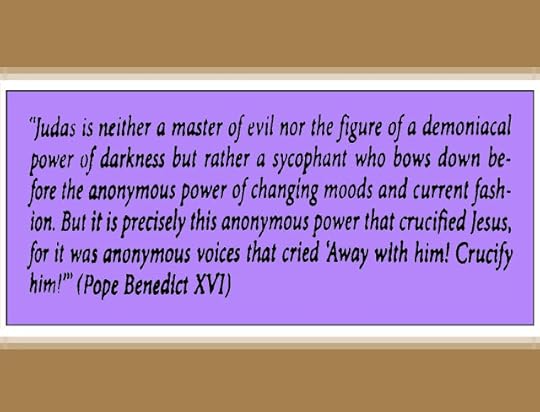
Judas betrayed Jesus. The anonymous voices of the crowd betrayed Jesus. We all betray Jesus, abandoning him to follow our own whims, or the current fashions of the moment.
We betray Jesus and abandon him because we prefer our own mediocrity.
(Text of above graphic taken from today's Magnificat.)
Published on March 28, 2018 16:22
March 27, 2018
Our Hope is Reborn
Published on March 27, 2018 14:02
March 24, 2018
Oscar Romero: Christ Has Loved All of Us
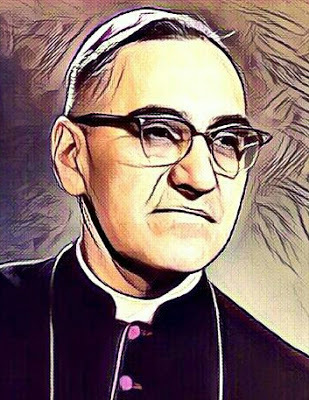 "Love must win out...."
"Love must win out...."Today is the commemoration of Blessed Oscar Romero, Archbishop of San Salvador, and the 38th anniversary of his martyrdom.
Romero was killed while saying Mass (at the altar, during the offertory) by a paramilitary "death squad" on March 24, 1980. It was in the early stages of El Salvador's awful 12 year civil war.
In my own lifetime, there have been so many dramatic events, so much appalling evil, so much heroic goodness.
In a tumultuous era of massive and often disconcerting changes, Christ's love remains the same. He has taken the true measure of our lives and given them meaning.
In Jesus Christ we stand firm and live in hope, come what may!
Blessed Oscar Romero, pray for us all, that we might be given the grace to always respond to violence with love.
Quotations from Archbishop Romero:
"How can the Church not be pained by a civilization of selfishness, this civilization of cruel inequalities where the poor, the helpless, the hungry, the naked, the homeless must exist as if they were not persons, were not our brothers and sisters.... But we are all one and the same flesh! We have the same origin and the same destiny! Christ has loved all of us and identified with all of us!"
"Let us not be discouraged even when the horizon of history appears dark and closed off, as if human realities made it impossible for God's plans to be accomplished. God can make use of human mistakes, even of people's sins, to overcome the darkness."
"Let us not tire of preaching love; it is the force that will overcome the world. Let us not tire of preaching love. Though we see that waves of violence succeed in drowning the fire of Christian love, love must win out; it is the only thing that can."
Published on March 24, 2018 16:16
March 22, 2018
Fields of Violence and the "Incomprehensible Silence" of God
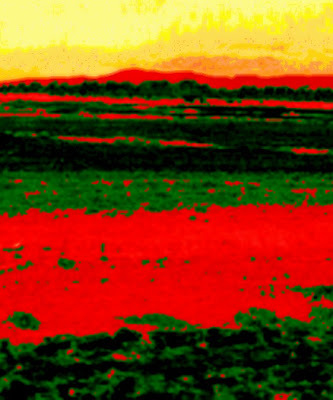 Recent research has brought me, once again, to face the horrors of the twentieth century; atrocities that were just so evil, in so many ways, on so many levels. I shall address some of the particular incidents more another time. I'm not ready to say anything about them yet.
Recent research has brought me, once again, to face the horrors of the twentieth century; atrocities that were just so evil, in so many ways, on so many levels. I shall address some of the particular incidents more another time. I'm not ready to say anything about them yet.For the present, I can only draw together a few thoughts.
There is nothing like the ruthlessness of ideologically-driven violence to wake us up from our illusions and remind us that sin is an offense against God.
The trajectory of sin leads to a distortion of reality that aspires to be an inversion of goodness. Sin (which includes even our own seemingly pedestrian sins) radically aims to "make evil to be good" and to "make good evil." Not surprisingly, as sin proliferates, it becomes a driving force, a program of violence, an "organization" designed to inflict cruelty and suffering on the innocent, to deform consciences, to spread destruction, to brutally and ruthlessly attack human beings and eradicate the human heart's desire for transcendence.
In the midst of it all, those who are afflicted wonder, "Where is God?"
We Christians cannot evade the mysterious weight of this question.
We should listen to the compelling stories of those who have endured these awful evils. Some of these stories are very, very hard to bear, and no one should take them up with idle curiosity. We should help one another to engage the facts and personal testimonies regarding the atrocities of the recent era, seek guidance from those who are more experienced and mature in faith, and find ways to participate in the ongoing process of healing.
A war, a persecution, a genocide may be "in the past," but wounds and scars remain. There are people who still need help, materially and spiritually.
Hopefully, what we learn will spur us on to a more serious commitment to love God and love our neighbor in every aspect of our lives. We will also be "shaken up" in a way that might lead us to pray harder, read and meditate more attentively on the Scriptures, recall the teaching of the Church, and turn more ardently to the all-encompassing suffering of the crucified Jesus. And we will be reminded of the need to rededicate ourselves to opposing evil, and seeking to overcome evil with good.
Of course, none of our efforts in this regard will make all of the concreteness of human wickedness and the terrible affliction that results from it "go away."
But they will draw us into a deeper faith and hope in the One who is greater than all our understanding, who calls us to endure with him our own afflictions, to fight against injustice as best as we can in this world, and to suffer with others even when all seems lost and they are utterly broken and powerless.
The question remains: "Where was God in 'the killing fields'?" People experience the pain of this question even today, and it's important for us to feel the force of it in our guts.
This doesn't mean we should lose confidence in God and his love for every human person. But the truth about history will strip this confidence of much that is sentimental and root it more firmly in the actual reality of God's love, beyond our feelings, beyond our understanding. It can awaken in us the courage to follow God's love to the peripheries of this world and hold fast to it in the most desperate extremities of life.
"Often we cannot understand why God refrains from intervening. Yet he does not prevent us from crying out, like Jesus on the Cross: 'My God, my God, why have you forsaken me?' (Mt 27:46).
"We should continue asking this question in prayerful dialogue before his face: 'Lord, holy and true, how long will it be?' (Rev 6:10). It is Saint Augustine who gives us faith's answer to our sufferings: 'Si comprehendis, non est Deus'—'if you understand him, he is not God.'
"Our protest is not meant to challenge God, or to suggest that error, weakness or indifference can be found in him. For the believer, it is impossible to imagine that God is powerless or that 'perhaps he is asleep' (cf. 1 Kg 18:27). Instead, our crying out is, as it was for Jesus on the Cross, the deepest and most radical way of affirming our faith in his sovereign power.
"Even in their bewilderment and failure to understand the world around them, Christians continue to believe in the 'goodness and loving kindness of God' (Tit 3:4). Immersed like everyone else in the dramatic complexity of historical events, they remain unshakably certain that God is our Father and loves us, even when his silence remains incomprehensible."
~Benedict XVI, Deus Caritas Est 38
Published on March 22, 2018 13:33

